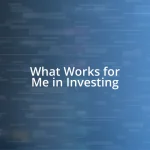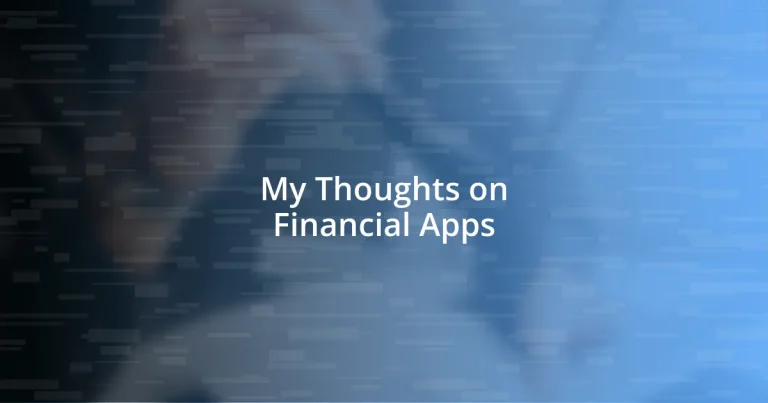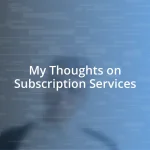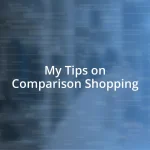Key takeaways:
- Financial apps enhance money management by providing real-time tracking, budgeting tools, and goal-setting features, promoting a more mindful approach to finances.
- Prioritizing user-friendly interfaces, robust security protocols, and customizable notifications is crucial when choosing the right financial app for effective management.
- Security measures such as multi-factor authentication and encryption are essential to protect sensitive financial information and ensure user peace of mind.
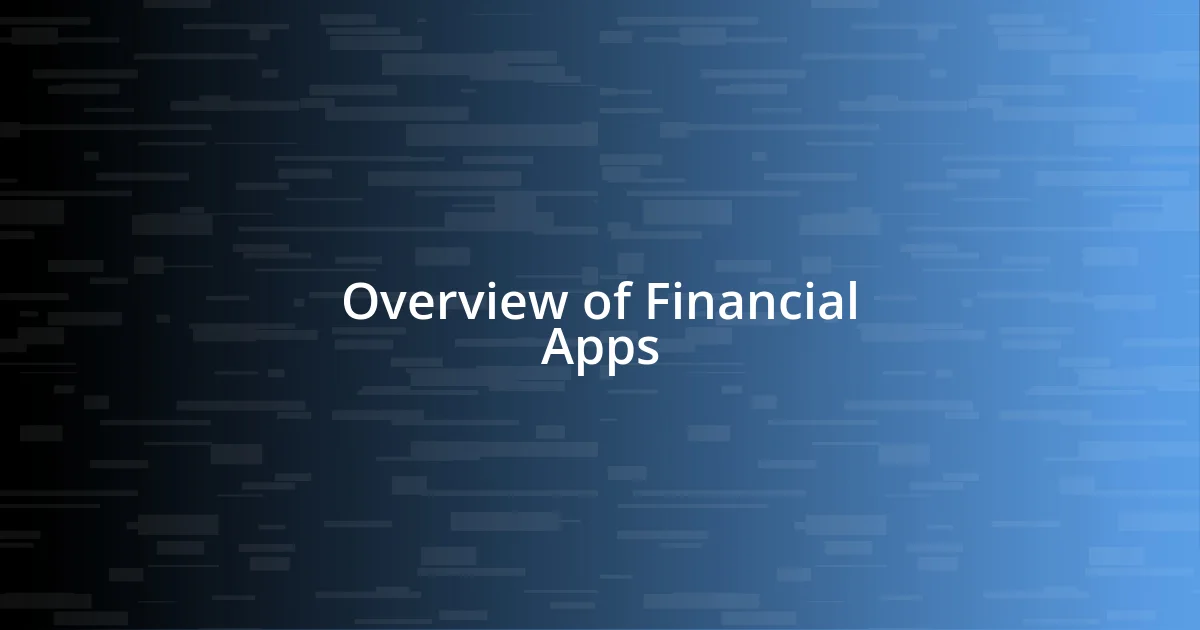
Understanding Financial Apps
Financial apps are revolutionizing the way we manage our money. I remember when I first downloaded one; it felt like having a personal accountant in my pocket. The ease of tracking expenses and setting budgets right from my phone was a game-changer for me. Have you ever thought about how much time we used to spend with spreadsheets or traditional ledgers?
Understanding the various types of financial apps can feel overwhelming, but that journey can actually be intriguing. Some focus on budgeting, while others emphasize investments or savings. Personally, I’ve found budgeting apps to be the most helpful, especially when I want to see where my money is going in real time. Isn’t it satisfying to visualize your spending habits and see where adjustments can be made?
As I’ve dived deeper into these tools, I’ve learned that the right app can lead to significant lifestyle changes. For instance, using a savings app motivated me to set aside money effortlessly, turning what felt like a burden into a rewarding habit. Have you ever experienced that little thrill when you watch your savings grow? It’s an emotion that adds a spark to financial responsibility!
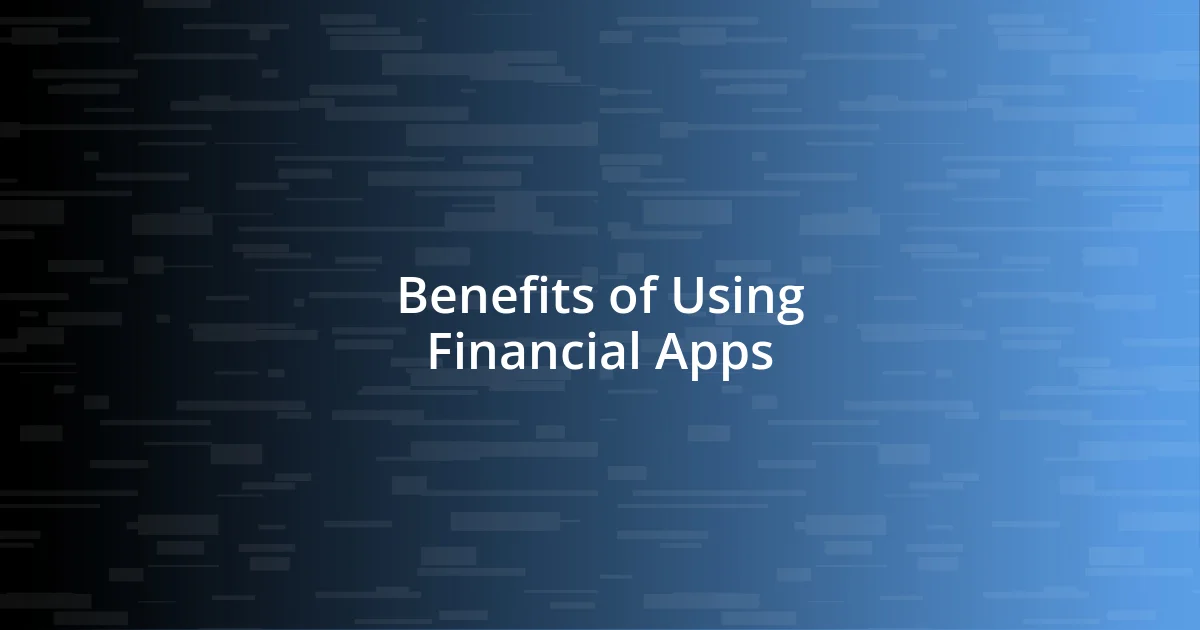
Benefits of Using Financial Apps
Using financial apps has transformed the way I approach my finances in remarkable ways. For one, the ability to receive real-time alerts about spending has profoundly changed my relationship with money. I recall a time when I received a notification for an unexpected subscription charge; it prompted me to review my spending habits right then and there. Suddenly, I was more mindful of my decisions, which felt empowering.
Here are some key benefits I’ve noticed while using financial apps:
- Convenience: Access to my financial data anytime, anywhere keeps me organized without the hassle of paperwork.
- Budgeting Tools: Many apps provide visual insights into spending categories, making it easier to see where adjustments are possible.
- Tracking Goals: Setting and tracking savings goals has become straightforward and motivating; seeing progress can be genuinely uplifting.
- Financial Education: Some apps offer educational resources to expand my understanding of personal finance, turning information into actionable knowledge.
- Integration: Connecting multiple accounts in one place saves time and gives me a holistic view of my financial health.
Integrating these tools into my daily routine has made financial management feel almost effortless, nurturing a sense of control that I never knew was possible.
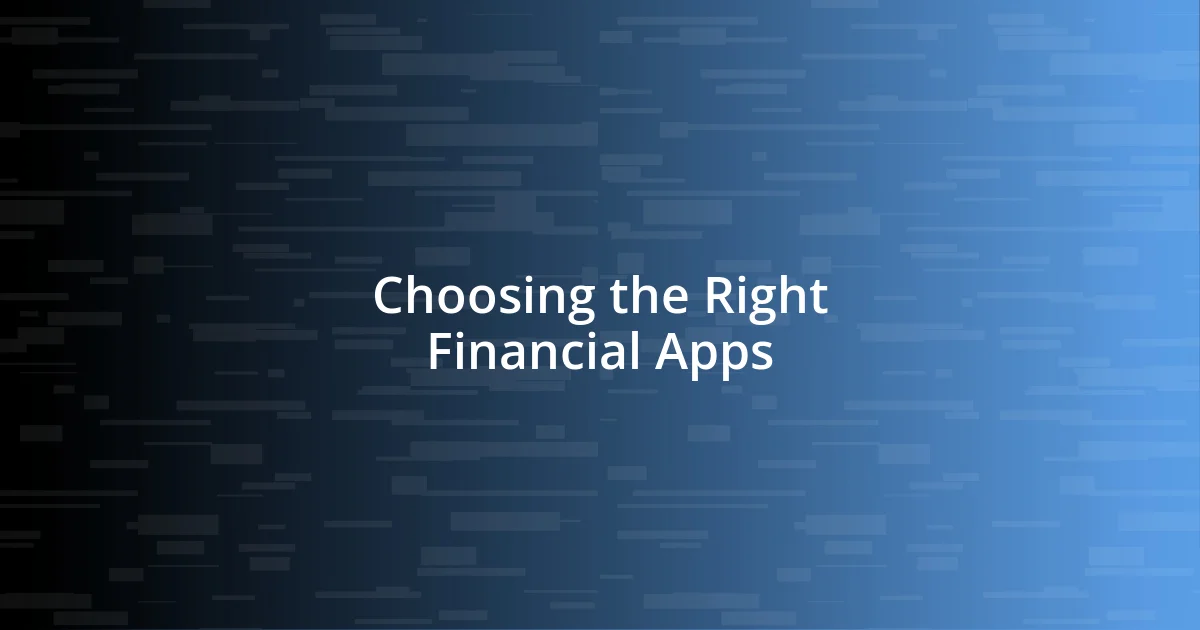
Key Features to Look For
One of the standout features I prioritize when exploring financial apps is user-friendly interfaces. It’s fantastic when an app feels intuitive, especially after some less-than-great experiences with confusing layouts. I once tried an investment app that looked sleek but was a navigation nightmare. I abandoned it quickly. A clear design makes tracking my finances feel less like a chore and more like a habit I can easily develop.
Another critical feature to consider is the app’s security protocols. Financial information is incredibly sensitive, so I make it a point to use apps that offer robust security measures, such as two-factor authentication. I vividly remember feeling apprehensive about linking my bank account to an app until I saw that it used bank-level encryption. Knowing my data is protected gives me peace of mind, allowing me to focus on managing my finances rather than worrying about potential breaches.
Additionally, customizable notifications can be a game-changer in how I interact with financial apps. These alerts help me stay on top of my spending and savings goals. For instance, I set up an alert to notify me when my balance dips below a certain level. I was genuinely impressed by how this simple reminder kept me from impulse spending. It’s like having a financial fairy godparent nudging me in the right direction!
| Feature | Importance |
|---|---|
| User-Friendly Interface | Makes navigation simple and enjoyable. |
| Security Protocols | Protects sensitive financial information. |
| Customizable Notifications | Keeps me updated on spending and savings goals. |
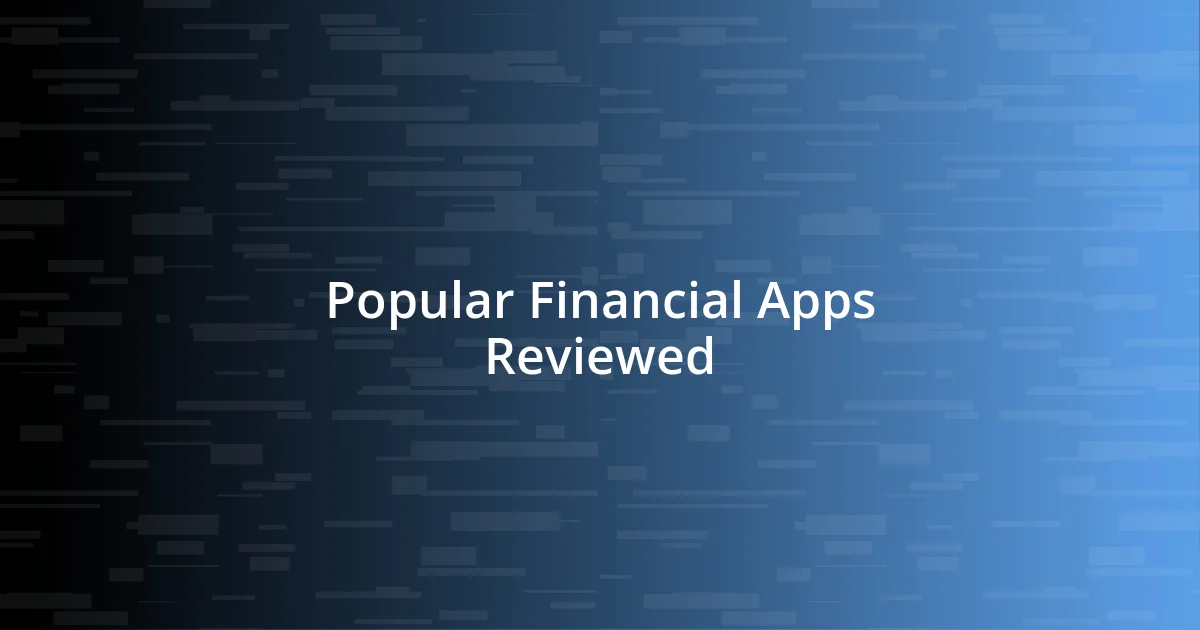
Popular Financial Apps to Consider
When it comes to popular financial apps, I’ve found that Mint consistently earns a place among my top recommendations. This app offers comprehensive budgeting features, and I love how it automatically pulls transactions from my linked accounts. I remember looking at my categorized spending for the month and realizing how much I was spending on dining out—it was an eye-opener, to say the least! It prompted me to allocate those funds more wisely, sparking a shift in my habits.
Another app I’ve been impressed by is YNAB (You Need A Budget). Its proactive approach to budgeting resonates with me because it encourages users to assign every dollar a job. I was initially skeptical about this method, thinking it seemed too rigid, but giving each dollar a purpose has truly reshaped my financial mindset. It makes me ask: what if every expense could lead to a more secure future? It’s a liberating feeling when I see how much control I really have.
I also can’t overlook the significance of investing apps like Robinhood. While I’ve had my fair share of ups and downs in the stock market, using Robinhood made investing feel accessible. I recall making my first trade and the rush of excitement I felt; it was as if I was stepping into a whole new world. Have you ever wondered how investing could be part of your everyday routine? It can be, and these user-friendly platforms make that leap much easier to navigate.
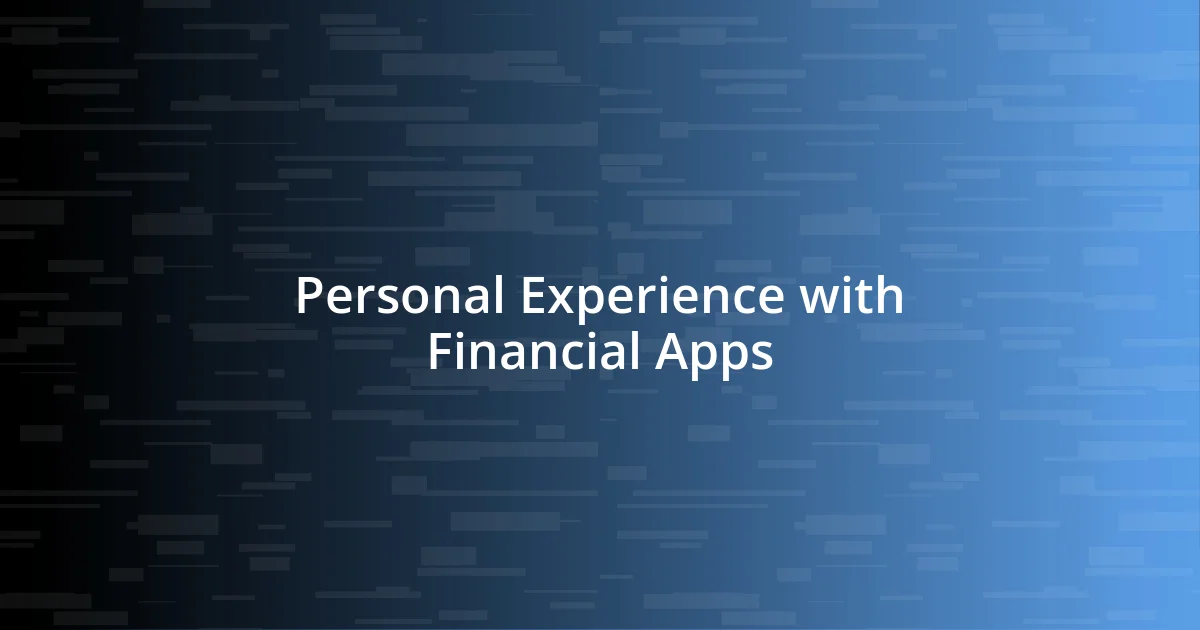
Comparing Financial Apps for Users
When comparing financial apps, one essential factor I consider is the range of features they offer. I remember downloading an app that boasted an extensive set of tools, only to discover that many were hidden behind a paywall. It left me feeling frustrated and disappointed because I expected more from what was marketed as a comprehensive solution. Having access to budgeting, tracking, and investment features in one app is crucial for seamless financial management.
Another aspect I find particularly important is customer support. After all, what good is an app if you can’t get help when you need it? I once encountered a glitch in a budgeting app that left my transactions in disarray. Reaching out for support felt like a lifeline; the response time and the quality of assistance can make or break the user experience. It’s a service that goes beyond the app’s functionality, ensuring that I feel valued as a user.
Lastly, I think about personalization when assessing financial apps. Everyone’s financial journey is unique, and I appreciate apps that allow me to tailor my experience. For example, I tried an app that suggested spending limits based on my historical data. At first, I was skeptical—could an algorithm really understand my lifestyle? But after a month of using it, I was pleasantly surprised to see how those personalized insights helped me align my spending with my financial goals. Isn’t it empowering when technology adapts to your needs rather than the other way around?
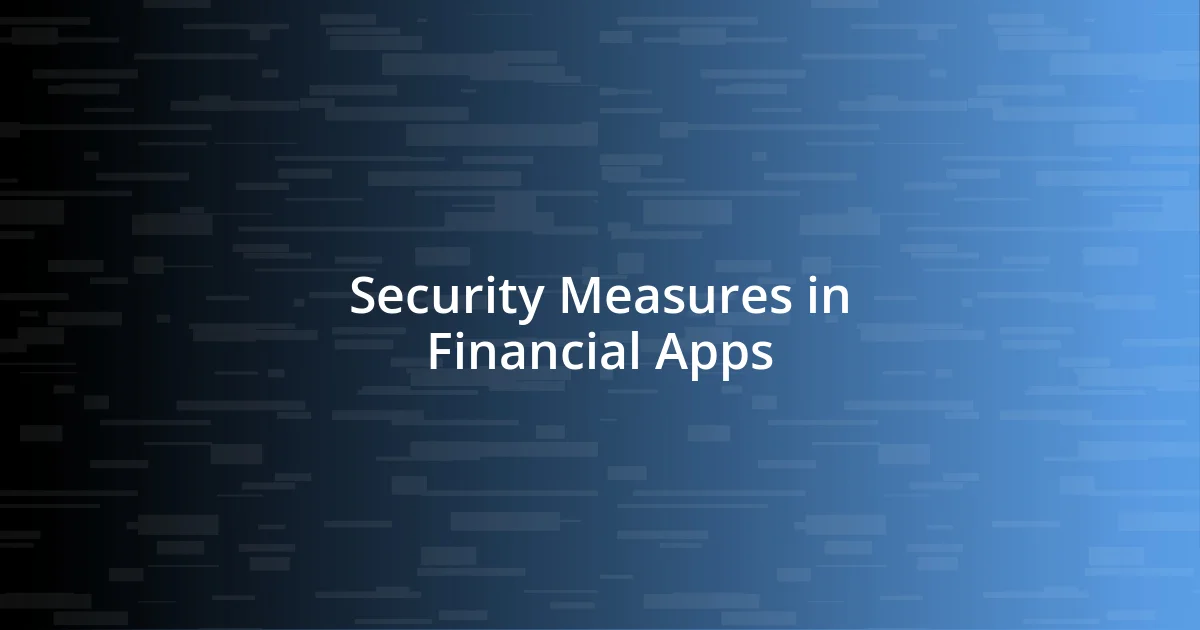
Security Measures in Financial Apps
When it comes to security measures in financial apps, I can’t stress enough the importance of multi-factor authentication (MFA). Recently, I set up this feature on my favorite budgeting app, and it felt like adding a second lock on my front door. Having that extra layer, requiring both my password and a verification code, makes me sleep better at night knowing my financial data is more secure.
Encryption is another key aspect I consider. I once read about how sensitive information can become susceptible to breaches if not adequately protected. It reminded me of the feeling I had when I chose an investment app that boasted end-to-end encryption. It assured me that my transactions would be shielded from prying eyes. Can you imagine the panic of realizing your financial details were exposed? I definitely don’t want to be in that situation!
Lastly, I think about regular security updates. I vividly recall a notification I received about an app updating its security features. It felt like the team behind the app was genuinely looking out for me. It’s crucial for these apps to stay ahead of potential threats; each update is like a friendly reminder that they care about my financial well-being. After all, in a digital world, are we ever truly safe without ongoing vigilance?



